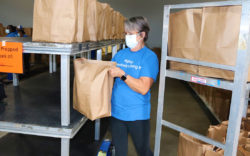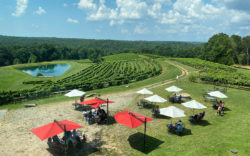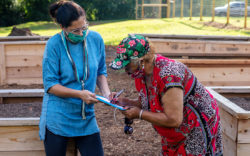This time of year, you will find the most dedicated gardeners in the backyard planting or seeding or hoeing weeds or mulching. Most, though, are indoors, leafing through gardening books and magazines and seed catalogs, recalling last summer’s successes and mistakes and planning for the spring.
Some make the extra effort to adhere to the strict rules of organic gardening. Many say they want to avoid consuming the chemicals that industrial farmers use to grow the idealized tomatoes, peppers and other produce we see at the supermarket. Others add that it’s all about the taste, that organic produce is fresher with more vibrant flavors.
The practice of organic gardening seems to hinge on a willingness to cooperate with nature, rather than attempting to dominate it. Nature provides many solutions to the kinds of problems that might plague organic gardeners who want to shun chemical fertilizers and pesticides that many say are harmful to health and will deplete soils.
Clyde Yates, owner of a company that works with clients to set up, maintain and harvest vegetable gardens, says that a family of four needs only six raised beds to cultivate most of the vegetables they might consume throughout the spring, summer and fall growing seasons.
Here are some basic tips, especially for newcomers who want to garden using native, unimproved soils:
• Get a soil test now, in early February. Chances are good the soil in your garden is acidic. University of Georgia Cooperative Extension agent Laura Ney says that 90% of soil tests recommend raising soil pH. The extension service offers sample bags of lime to raise the pH.
• Add compost and till into native soil. Dug deeply enough, compost will improve pore space, allowing nutrients and water to penetrate.
• Organize raised beds using some kind of edging. Raised beds help keep soil loose and deter weeds. They also provide easy walkways between the beds.
• Mulch. Use compost or other organic mulch to lower soil temperatures in the summer, deter weeds and increase the soil’s organic content.
• Purchase quality, organic seed from known providers. Many gardeners recommend Johnny’s, a provider in Maine, and Seed Savers Exchange in Iowa. You can purchase seeds locally from Cofer’s or Athens Seed Co. in Watkinsville.
• Select crops that are known to work, such as tomatoes, squash, peppers and okra.
• Include flowering herbs, such as rosemary, thyme and hyssop, that attract beneficial insects that in turn eat the bad guys like aphids. Attract your own army of wasps, and they will take out those pests!
• Site your garden as close to your kitchen door as possible. You’ll be more watchful of changes, and harvesting will be more convenient.
• Set up an inventory of Organic Materials Review Institute-approved products that you may need when trouble strikes. Ney suggests stocking spinosad, soil bacteria that is toxic to many pests; horticulture oil that gardeners apply to plants to suffocate insect larva; and pyrethrins, a chemical derived from chrysanthemums. Williams Garden Farm Manager Seth Nivens also recommends conceding defeat if a problem gets out of hand, and advises complete removal of the plants to help evict the pests from the garden.
• Yates suggests learning to use a hoe properly to speed up weeding. Hold the hoe vertically and swing, like a broom, to slice off the crown of the weeds about an inch below the surface. The blade should be parallel to the ground.
• During dormant season, seed the garden with cover crops like rye, buckwheat, cowpeas or clover. These crops help improve the soil and protect it from erosion, and can be tilled into the soil to add nitrogen before the next planting season.
Several local community gardens practice organic gardening. Winterville Community Garden hosts 79 raised, irrigated beds near City Hall, complete with improved soils, that are owned by the city and leased out for just $40 per year. Gardeners will sign up on Feb. 17. Bring cash or a check, and a dish to pass at the potluck dinner hosted for your fellow gardeners.
Williams Garden is on a south-facing slope owned by the Athens Land Trust and staffed full-time by gardeners who supply fresh vegetables to its CSA subscription clients who sign up for 12 weeks of fresh produce. The 5-acre former pasture is laid out with neat rows of winter vegetables on one side, with the other side covered in winter with heavy plastic to deter weeds for upcoming spring and summer crops. Nivens cultivates the land using progressive “no till” techniques that he says help beneficial soil microbial activity. The land trust operates the garden as a learning environment, as well, and invites volunteers to help out and learn about organic gardening on Tuesdays and Thursdays from 10 a.m. to noon during the growing season.
The Handmade Garden is a quirky space tucked into a low spot near Reese and Pope Park. Operated by Karen Witten and Tommy Lewis Chester, it features raised beds edged with rocks and walking paths that double as channels for the water that pours through the garden during rains. The space is owned by several nearby homeowners and leased to the garden for $10 per month. Construction of new student housing threatens to reduce sunlight for the garden, so Witten and Chester have begun to plant more fruits, such as blueberries, paw paws and figs.
One last tip from the Hungry Gnome: Be patient. Yates says that with good preparation, organic gardening will be less of a chore and can become a very rewarding hobby.
Like what you just read? Support Flagpole by making a donation today. Every dollar you give helps fund our ongoing mission to provide Athens with quality, independent journalism.










